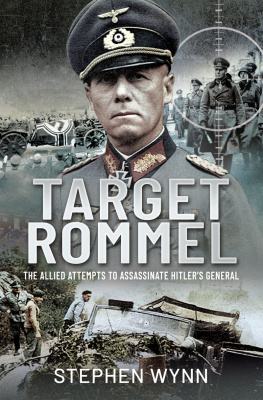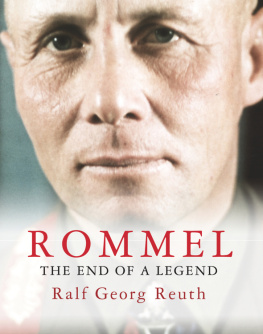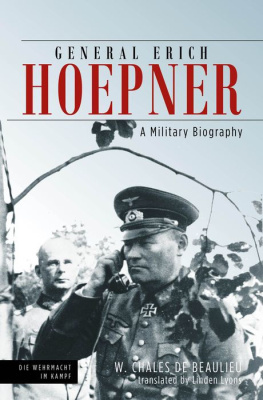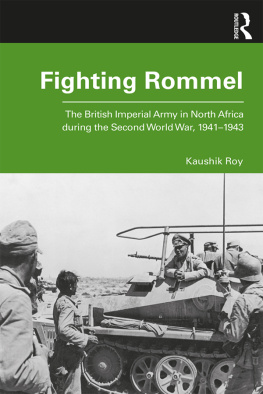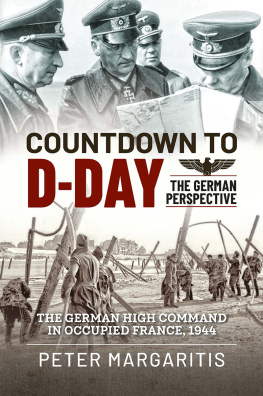Pagebreaks of the print version

TARGET ROMMEL
THE ALLIED ATTEMPTS TO ASSASSINATE HITLERS GENERAL
TARGET ROMMEL
THE ALLIED ATTEMPTS TO ASSASSINATE HITLERS GENERAL
STEPHEN WYNN
First published in Great Britain in 2022 by
PEN & SWORD MILITARY
An imprint of
Pen & Sword Books Ltd
Yorkshire - Philadelphia
Copyright Stephen Wynn, 2022
ISBN 978 1 39900 712 2
ePUB ISBN 978 1 39900 713 9
Mobi ISBN 978 1 39900 713 9
The right of Stephen Wynn to be identified as Author of this work has been asserted by him in accordance with the Copyright, Designs and Patents Act 1988.
A CIP catalogue record for this book is available from the British Library
All rights reserved. No part of this book may be reproduced or transmitted in any form or by any means, electronic or mechanical including photocopying, recording or by any information storage and retrieval system, without permission from the Publisher in writing.
Pen & Sword Books Ltd incorporates the imprints of Pen & Sword Archaeology, Atlas, Aviation, Battleground, Discovery, Family History, History, Maritime, Military, Naval, Politics, Social History, Transport, True Crime, Claymore Press, Frontline Books, Praetorian Press, Seaforth Publishing and White Owl
For a complete list of Pen & Sword titles please contact
PEN & SWORD BOOKS LTD
47 Church Street, Barnsley, South Yorkshire, S70 2AS, England
E-mail:
Website: www.pen-and-sword.co.uk
Or
PEN & SWORD BOOKS
1950 Lawrence Rd, Havertown, PA 19083, USA
E-mail:
Website: www.penandswordbooks.com
Dedicated to Private Edward George Arthur Madden (2345008), a 3-inch mortar specialist in both the Essex and Royal Suffolk regiments, who was stationed in Cyprus and Germany from 1957-60. Thank you for your service.
Introduction
This book is about British operations that were planned during the Second World War to capture or kill Johannes Erwin Eugen Rommel, better known as Erwin Rommel, although he was so well recorded in the annals of history that, to many, simply the name Rommel was sufficient to know to whom it referred.
Separating the myth that surrounds him from the reality of who and what he was, it becomes clear why the Allies, the British in particular, were so determined to capture or kill him that three special operations were planned, although one was turned down by the military authorities.
In many ways Rommel was a complex individual. Born into a reasonably well-to-do family, he was of a class in society where there were expectations of him to make something of his life. His choice on how he would achieve this, from an early age, was a career in the military. On this point, he did not waver; his single mindedness and steely determination to be successful were traits that he never lost.
He served as an officer in the First World War, the same war that saw Adolf Hitler serve as a corporal, but their paths never crossed. Life for a German soldier during the First World War was more straightforward, because there was only the Imperial German Army. There was no SS, no Gestapo, no Nazi Party and no Fhrer, and it was a totally different war, which for most of the time, on land, was restricted to trench warfare. Aircraft didnt play a massive part in the war, especially in the early years where they were viewed as more of an observation platform.
During the time between the end of the First World War and the beginning of the Second World War, Rommel remained in the army, and was an effective and fair leader during times of social and political unrest throughout Germany where there was a big push to turn the nation into a socialist republic.
Rommel first met Hitler in 1934 in the historic Lower Saxony town of Goslar where he was stationed at the time. It was an important centre both from a civilian perspective and a military one. The Ministry of Food and Agriculture was based there and there were a number of supply companies who made goods for the German war effort, as well as two smaller concentration camps nearby.
The following year Rommel became a military instructor at the Potsdam War Academy, where he spent the next three years, and it was during this time that he wrote and published what became a best-selling book on infantry tactics, entitled Infanterie greift an , Infantry Attacks. It was as a result of his growing reputation as a military instructor that he came to the attention of Adolf Hitler, who in 1938 placed him in charge of his Fhrerbegleitbatallion (FBB) or escort brigade.
All of these different aspects of Rommels private life and military career assist in the clarification of his true nature. Was he a Nazi, or a loyal German who simply wanted the return of his once great nation? Was he a military genius or an average soldier whose skills, abilities and triumphs were glorified and enhanced by the Nazi Party so that they could reflect in the achievements of a man they saw as one of their own? Regardless of what he was or wasnt, he was seen by the British government and military authorities as a big enough threat to their winning or losing the war, that he warranted kidnapping or assassinating. This was a view which obviously did not change throughout the course of the war as there were two and a half years between each of the two attempts to capture or kill him.
Chapter One
Rommels Early Life
Johannes Erwin Eugen Rommel was more commonly referred to as the Desert Fox ( Wstenfuchs ), making him the only enemy general British soldiers had given a nickname to. His military exploits during the Second World War, particularly in North Africa between 12 February 1941 and 9 March 1943, undoubtedly helped to cement his reputation as one of the most charismatic, well-respected and effective senior German officers of the war.
He was born in the picturesque town of Heidenheim, in Baden-Wrttemberg, Southern Germany, on 15 November 1891, into a loving well-off, middle class family. His father, also Erwin, was a teacher and had in his younger days been a military man, serving as a lieutenant in the German Army. His mother, Helene, was from a reasonably influential family as her father, Karl von Lutz, was a politician who served in the parliament of the state of Wrttemberg. As a younger man, von Lutz had served in the German Army where he was awarded the Knights Cross, First Class of the Order of the Crown, as well as numerous other awards, which in turn saw him become a member of German nobility. Rommel was one of five children, and the second of four sons born to Erwin and Helene. He was also the only one who chose a career in the military.
In 1899, having made his career choice, he became an ensign, or Fhnrich in the Wrttemberg Infantry Regiment No. 124, and was stationed at Weingarten, where he remained for eleven years until he went on to officer cadet school in Danzig, today better known as Gdansk, a city on the Baltic coast of northern Poland. He was successful in his military studies and graduated in November 1911, before returning to the 124th Infantry Regiment in Weingarten, having being commissioned as a lieutenant in January 1912. With the First World War still some thirty months away, a war that nearly everybody knew was coming, Germanys preparations were already well under way.
In 1913, whilst stationed in Weingarten as a military instructor, Rommel began an affair with a local girl, 21-year-old Walburga Stemmer. He was struck by her natural beauty and she was taken by his dashing appearance and handsome good looks. It was a relationship of emotional feelings and not just lust but which, within a year, resulted in the birth of an illegitimate daughter, Gertrude Stemmer, who was born on 8 December 1913. The surname that appeared on her birth certificate was her mothers rather than Rommels. There is no record of what his feelings were when he was first told by Walburga that she was pregnant, but rather than being shocked, questioning whether he was the father, or riddled with guilt because he was already engaged to another girl, Rommel announced that he wanted to set up home with Walburga and Gertrude; but the happy family unit never came to fruition.

